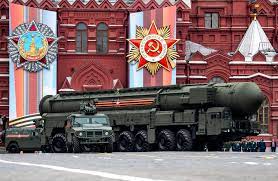Next, an editorial reflecting the views of the United States government. Among his first actions in office, President Joe Biden proposed a five-year extension of the New START Treaty, the last remaining nuclear arms control agreement between the United States and Russia. The treaty is set to expire on February 5. In their first phone call, President Biden and Russian President Vladimir Putin discussed their countries’ willingness to extend New START, and they agreed to have their teams “work urgently to complete the extension by February 5,” the White House said in a January 26 readout of the call. The day after the two presidents spoke, both houses of the Russian parliament voted unanimously to extend the treaty for five years. The New START treaty was signed in 2010 by President Barack Obama and Russian President Dmitry Medvedev. It limits each country to 1550 deployed nuclear warheads and 700 deployed missiles and bombers, and 800 deployed and non-deployed ICBM and SLBM launchers and bombers. It also allows for extensive on-site inspections to verify compliance. White House Spokesperson Jen Psaki noted in a briefing to reporters that “New START is the only remaining treaty constraining Russian nuclear forces and is an anchor of strategic stability between our two countries.”

Pentagon Press Secretary John Kirby said that Russia’s compliance with the New START treaty “has served our national security interests well, and Americans are much safer with New START intact and extended.” He added, “Extending the treaty’s limitations on stockpiles of strategic nuclear weapons until 2026 allows time and space for our two nations to explore new verifiable arms control arrangements that could further reduce risks to Americans.” The United States remains clear-eyed about the challenges Russia presents, however, and the potential for arms control to contend with China’s rapidly growing nuclear arsenal. In the call with President Putin, besides discussing the extension of the New START, President Biden raised several destabilizing actions on Russia’s part, including its threats to Ukraine’s sovereignty; the SolarWinds cyber hack that compromised companies and U.S. government agencies; interference in the 2020 U.S. election; reports of Russia’s placing bounties on U.S. soldiers in Afghanistan; and the poisoning of Russian dissident Aleksey Navalny. President Biden told reporters, “I find that we can both operate in the mutual self-interest of our countries, as a new START agreement, and make it clear to Russia that we are very concerned about their behavior.” That was an editorial reflecting the views of the United States government.
VOA译文由可可原创,未经许可请勿转载。












